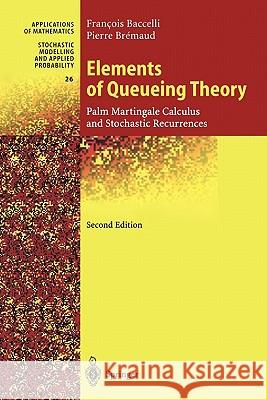Elements of Queueing Theory: Palm Martingale Calculus and Stochastic Recurrences » książka
Elements of Queueing Theory: Palm Martingale Calculus and Stochastic Recurrences
ISBN-13: 9783642085376 / Angielski / Miękka / 2010 / 334 str.
Queueing theory is a fascinating subject in Applied Probability for two con- tradictory reasons: it sometimes requires the most sophisticated tools of stochastic processes, and it often leads to simple and explicit answers. More- over its interest has been steadily growing since the pioneering work of Erlang in 1917 on the blocking of telephone calls, to the more recent applications on the design of broadband communication networks and on the performance evaluation of computer architectures. All this led to a huge literature, articles and books, at various levels of mathematical rigor. Concerning the mathematical approach, most of the explicit results have been obtained when specific assumptions (Markov, re- newal) are made. The aim of the present book is in no way to give a systematic account of the formulas of queueing theory and their applications, but rather to give a general framework in which these results are best understood and most easily derived. What knowledge of this vast literature is needed to read the book? As the title of the book suggests, we believe that it can be read without prior knowledge of queueing theory at all, although the unifying nature of the proposed framework will of course be more meaningful to readers who already studied the classical Markovian approach.











